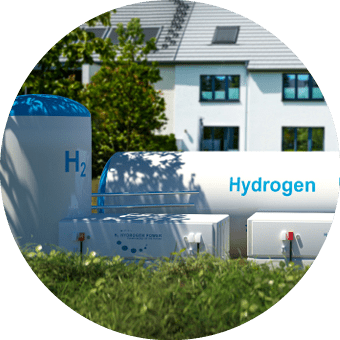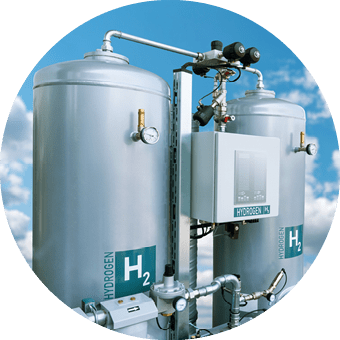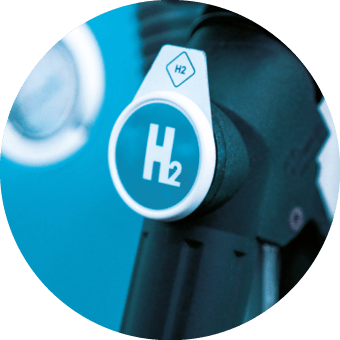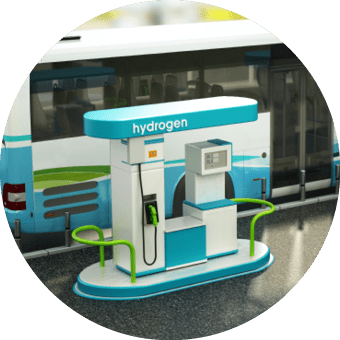

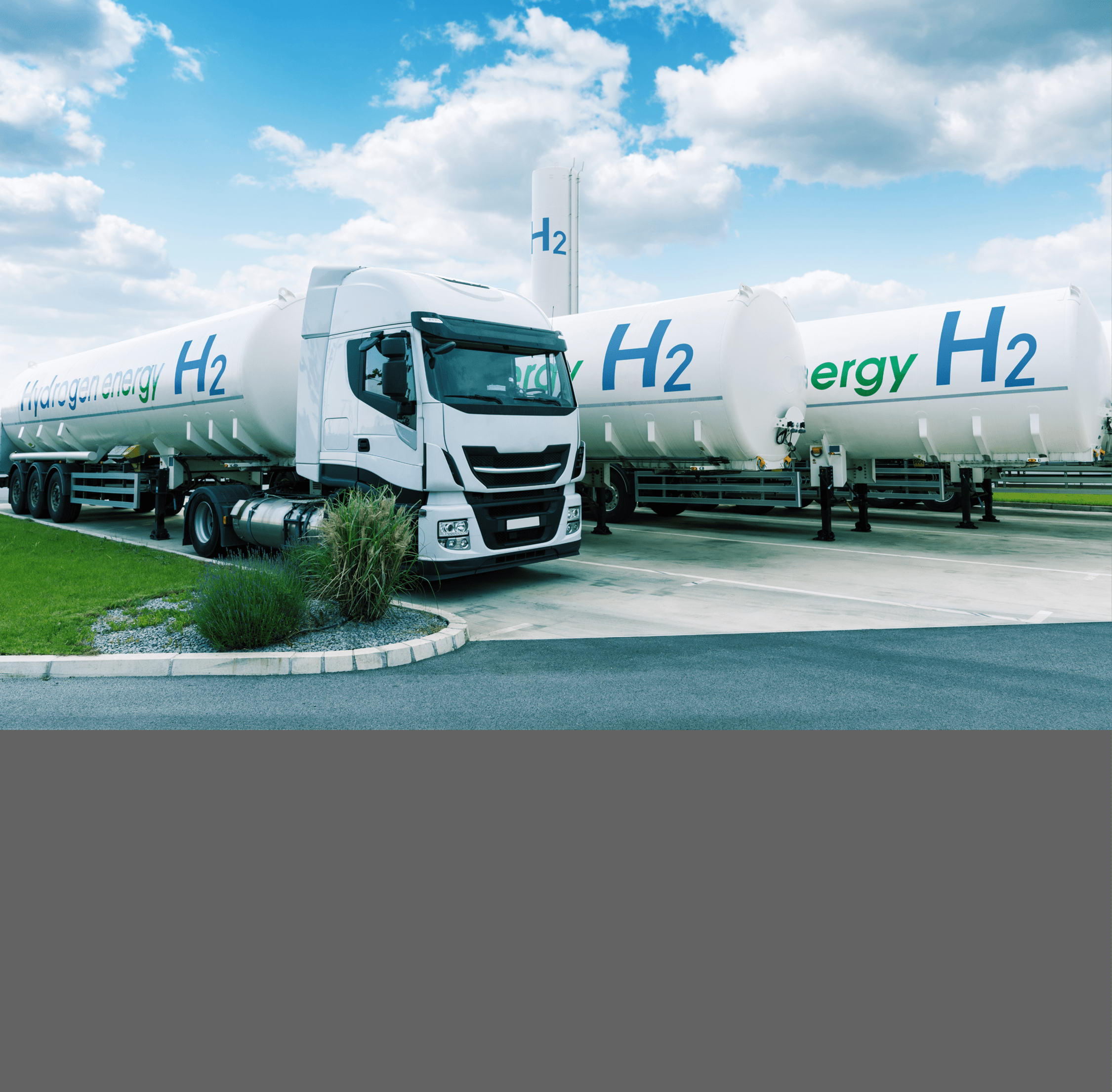
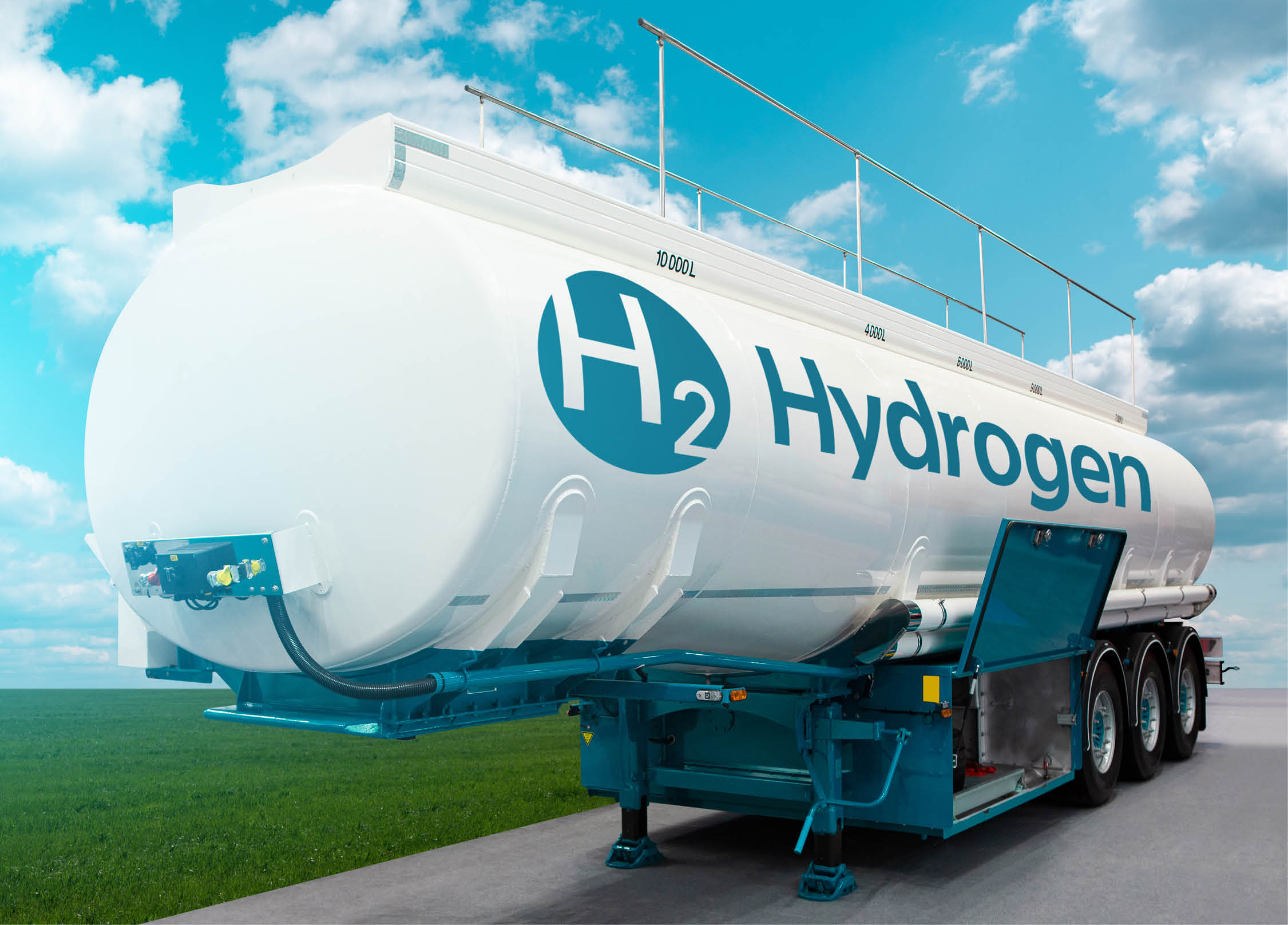
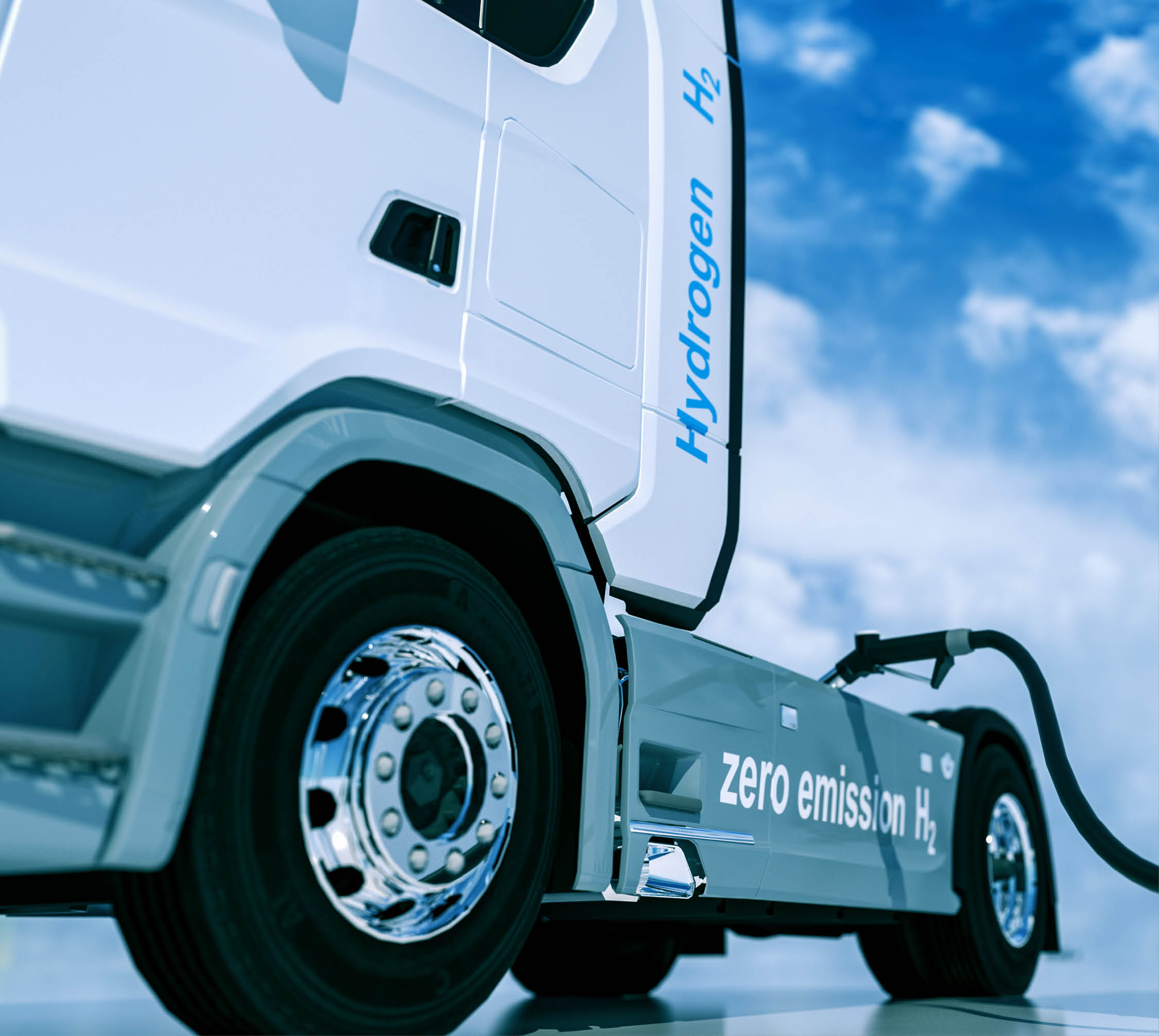
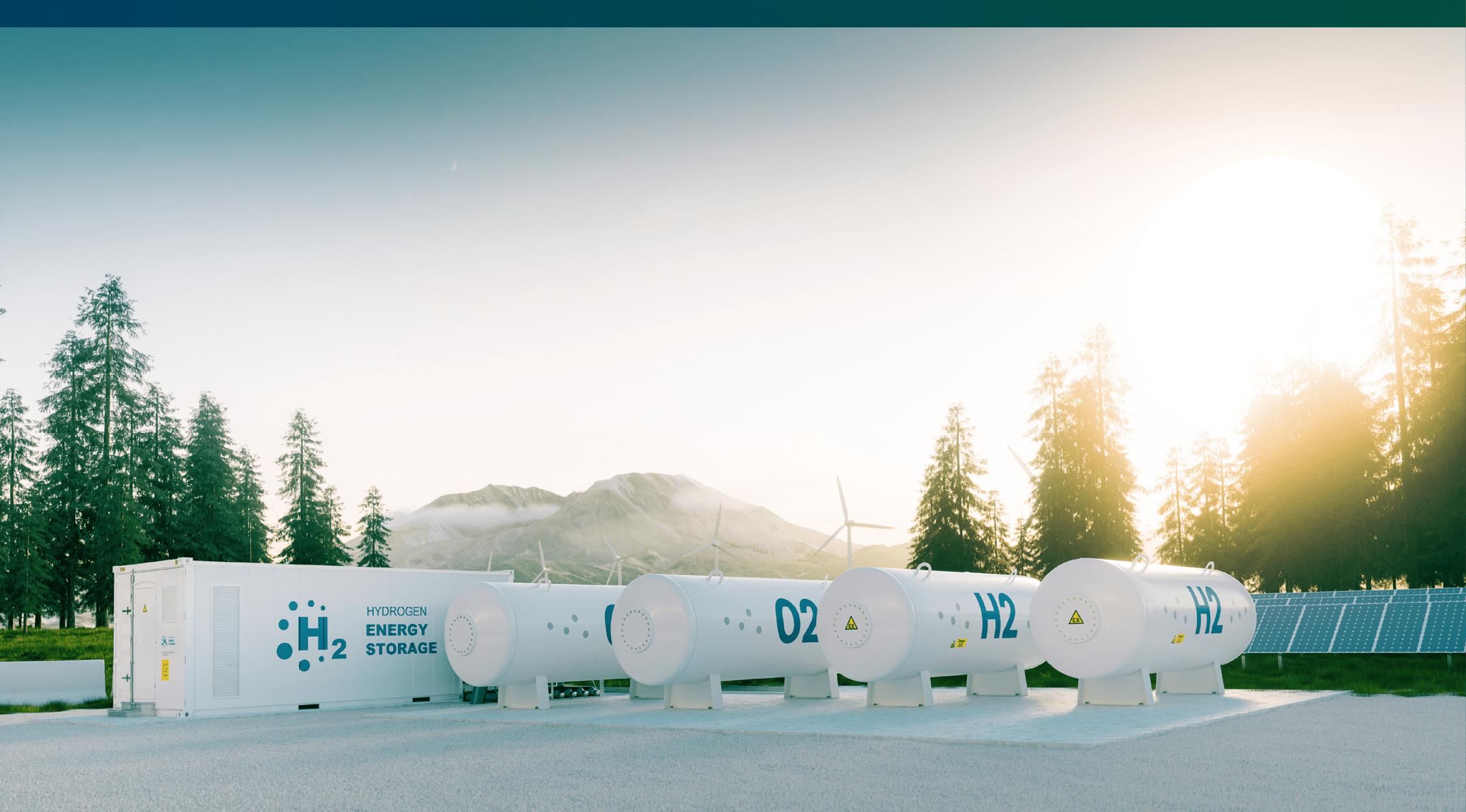
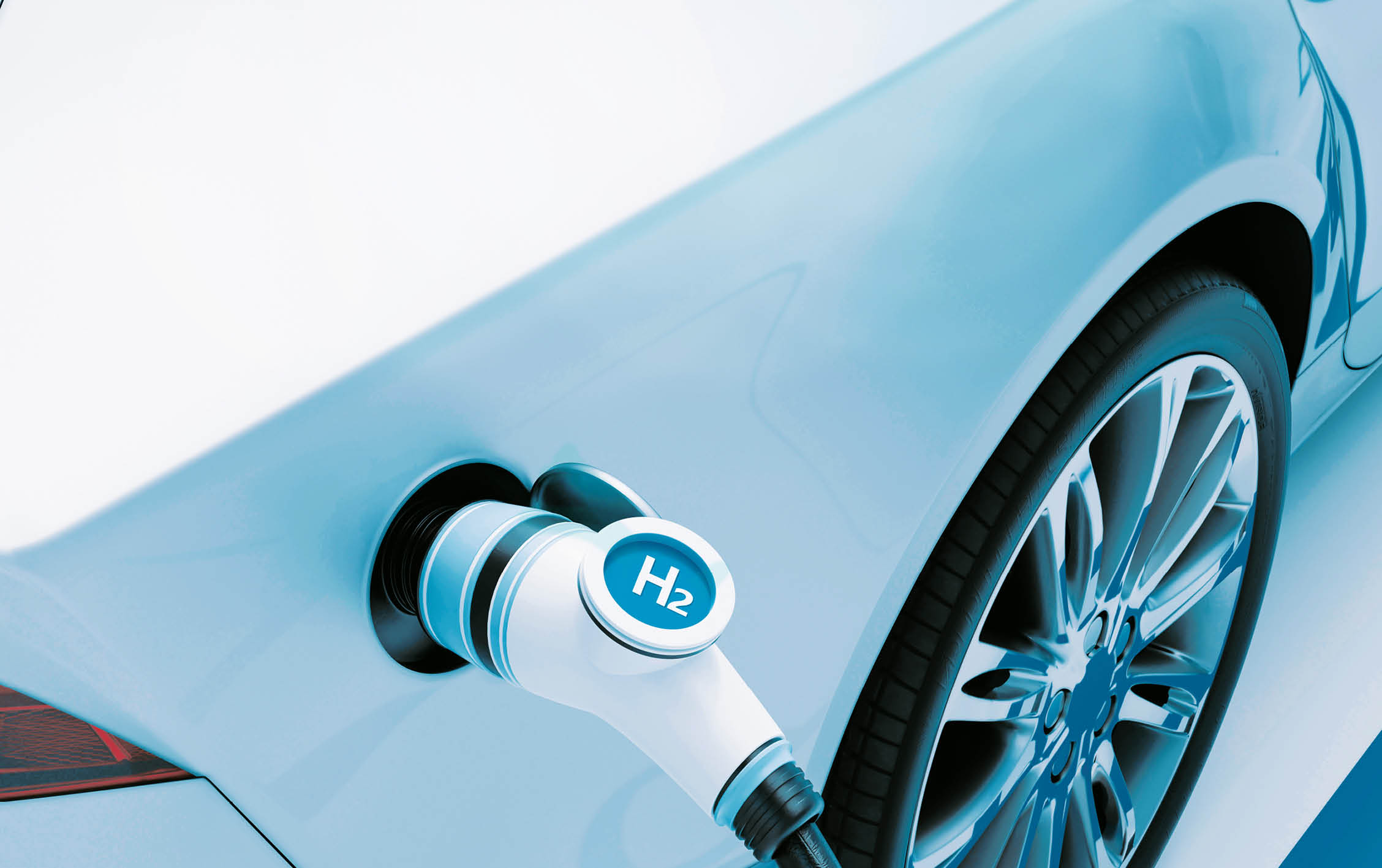


Home

 Article L. 811-1 of the Energy Code: defines three categories of hydrogen (renewable, low-carbon and carbonaceous) according to their production methods:
Article L. 811-1 of the Energy Code: defines three categories of hydrogen (renewable, low-carbon and carbonaceous) according to their production methods:
The Energy Code also includes provisions on:
 Law no. 2023-175 of 10 March 2023: on accelerating the production of renewable energy.
Law no. 2023-175 of 10 March 2023: on accelerating the production of renewable energy.
 Law no. 2021-1104 of 22 August 2021: on the fight against climate change and on strengthening resilience to its effects.
Law no. 2021-1104 of 22 August 2021: on the fight against climate change and on strengthening resilience to its effects.
 Order no. 2021-167 of 17 February 2021: regulates the development of green hydrogen projects and defines the three categories of hydrogen and the corresponding applicable regulations, as well as the associated guarantees of traceability (Articles L. 811-1 onwards of the Energy Code).
Order no. 2021-167 of 17 February 2021: regulates the development of green hydrogen projects and defines the three categories of hydrogen and the corresponding applicable regulations, as well as the associated guarantees of traceability (Articles L. 811-1 onwards of the Energy Code).
 Law no. 2015-992 of 17 August 2015: on energy transition for
Law no. 2015-992 of 17 August 2015: on energy transition for
green growth.
 Installation Classified for the Protection of the Environment (ICPE) regulation: on the production, storage and distribution of hydrogen, with corresponding provisions in the Environmental Code.
Installation Classified for the Protection of the Environment (ICPE) regulation: on the production, storage and distribution of hydrogen, with corresponding provisions in the Environmental Code.
 The EU Innovation Fund/Hydrogen Bank is an EU-level fund aiming to bridge the cost gap between green hydrogen and hydrogen production based on carbon-emitting fossil fuels, with hydrogen producers invited to bid for financial support based on their anticipated production of green hydrogen.
The EU Innovation Fund/Hydrogen Bank is an EU-level fund aiming to bridge the cost gap between green hydrogen and hydrogen production based on carbon-emitting fossil fuels, with hydrogen producers invited to bid for financial support based on their anticipated production of green hydrogen.
 The Trans-European Transport Network (TEN-T) – the European Commission has selected 26 projects from 12 Member States to receive funding for the deployment of alternative fuel infrastructure along the TEN-T.
The Trans-European Transport Network (TEN-T) – the European Commission has selected 26 projects from 12 Member States to receive funding for the deployment of alternative fuel infrastructure along the TEN-T.
Among the projects selected, four are French and two of which involve hydrogen infrastructure.
The French government announced its National Strategy for the Development of Hydrogen (NSDH) in September 2020.
The NSDH has three objectives:
These three objectives have been translated into three priorities:
The NSDH should help achieve France’s long-term energy goals, among which the development of low-carbon and renewable hydrogen to reach 20-40% of total hydrogen and industrial hydrogen consumption by 2030.
France is also a key participant in the H2MeD project – a subsea hydrogen pipeline jointly developed with Spain and Portugal, with further participation from Germany, capable of transporting 2 million tonnes of green hydrogen per year from Spain and aiming for completion by 2030.
The pipeline offers an alternative to the defunct 2003 MidCat pipeline project which was to have carried gas across the Pyrenees from Spain to France.
As of 2023, 94% of France's industrial hydrogen output is produced with
fossil fuels.

Key legislation

Key regulatory bodies
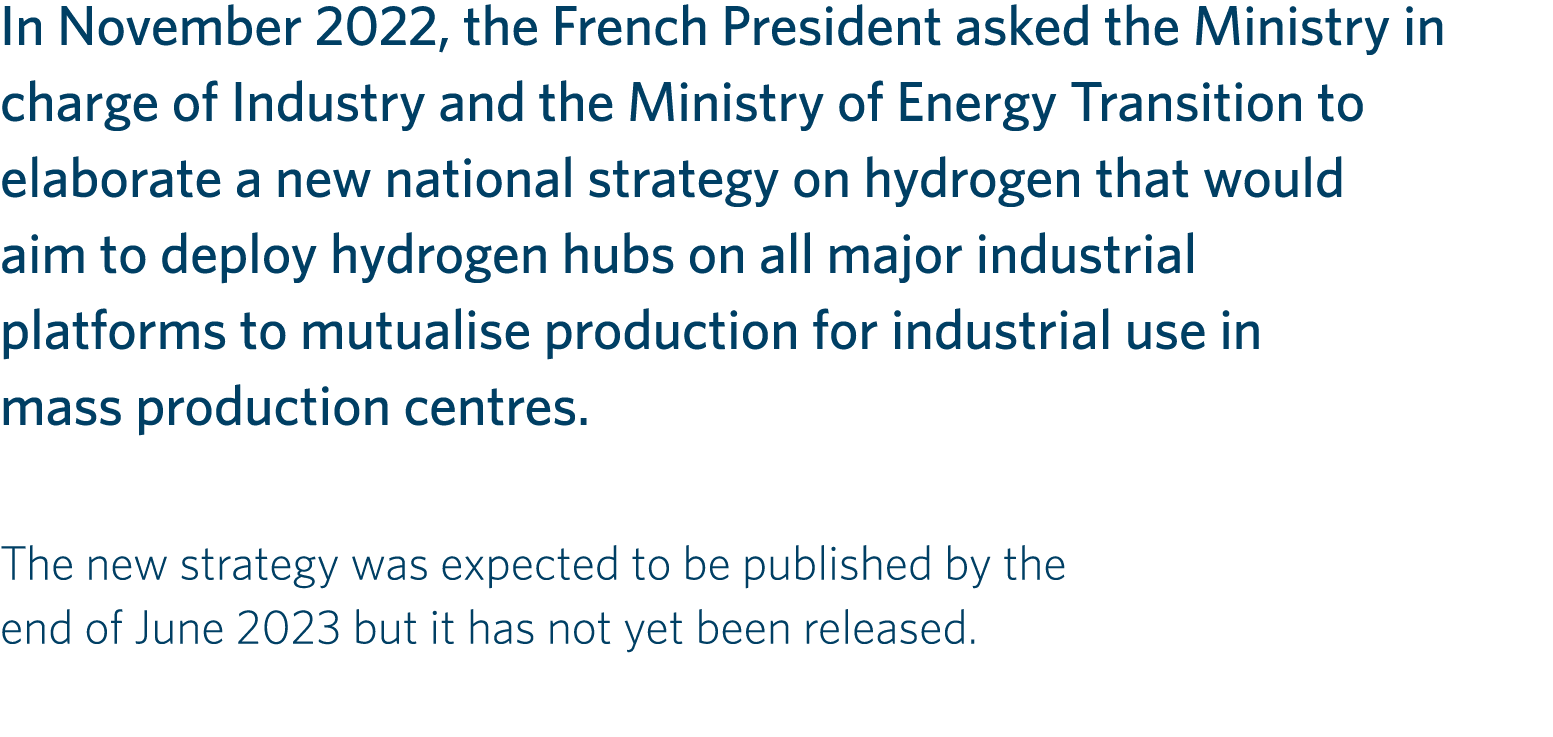
Anticipated near-term regulatory changes
Two calls for projects were launched in October 2020:
 The "Bricks and Demonstrators" call for projects amounts to €350 million and aims to develop or improve components and systems for the production, transport and uses of hydrogen.
The "Bricks and Demonstrators" call for projects amounts to €350 million and aims to develop or improve components and systems for the production, transport and uses of hydrogen.
 The "Local Hydrogen Ecosystems" call for projects amounts to €275 million and aims at deploying hydrogen uses (e.g. industry, transport) by bringing together authorities and industry providers of solutions and local large-scale ecosystems.
The "Local Hydrogen Ecosystems" call for projects amounts to €275 million and aims at deploying hydrogen uses (e.g. industry, transport) by bringing together authorities and industry providers of solutions and local large-scale ecosystems.
A government communication of 17 May 2023 announced an additional €175 million to develop the hydrogen industry, as part of the 'France 2030' initiative – a national investment plan launched in 2021 and endowed with €34 billion to be deployed partly via funding and subsidy schemes.
The main objective of this fund is to develop ecosystems that combine different elements of the hydrogen industry: hydrogen production, hydrogen distribution and hydrogen uses (industrial uses or for mobility).
The projects submitted will be evaluated, put into competition and selected in three categories:
The NSDH also provides for public support of €9 billion until 2030. As part of this plan, the Ministry of Energy Transition announced at the end of August 2023 that €4 billion will be allocated via call for projects that will be launched in 2024, 2025 and 2026.
The decree (Decree no. 2023-854 of 1 September 2023 on support systems for the production of certain categories of hydrogen) organising the tendering procedure for the selection of projects was published in the Official Journal on 3 September 2023.
French schemes
 Commission de régulation de l'énergie (CRE) – The French Energy Regulatory Commission
Commission de régulation de l'énergie (CRE) – The French Energy Regulatory Commission
 Agence de la transition écologique (ADEME) – The French Agency for Ecological Transition
Agence de la transition écologique (ADEME) – The French Agency for Ecological Transition
EU schemes
The terms of hydrogen purchase agreements in France vary depending on several factors, including the specific parties involved, the scale of the hydrogen project, and the market conditions at the time of the agreement.
General terms and considerations that may be included in hydrogen purchase agreements include:
 Hydrogen purity and quality: The agreement will specify the required purity and quality standards for the hydrogen supplied.
Hydrogen purity and quality: The agreement will specify the required purity and quality standards for the hydrogen supplied.
 Volume and delivery schedule: The agreement will specify the quantity of hydrogen to be supplied, along with a delivery schedule that outlines when and how much hydrogen will be delivered.
Volume and delivery schedule: The agreement will specify the quantity of hydrogen to be supplied, along with a delivery schedule that outlines when and how much hydrogen will be delivered.
 Delivery terms: The agreement will specify the terms of delivery, including the location(s) where hydrogen will be delivered, responsibility for transportation, and any associated costs.
Delivery terms: The agreement will specify the terms of delivery, including the location(s) where hydrogen will be delivered, responsibility for transportation, and any associated costs.
 Price and pricing mechanism: The agreement will outline the pricing structure and may include provisions for price adjustments over time.
Price and pricing mechanism: The agreement will outline the pricing structure and may include provisions for price adjustments over time.
 Payment terms: The agreement will specify how and when payments will be made.
Payment terms: The agreement will specify how and when payments will be made.
 Contract duration.
Contract duration.
 Force majeure and termination clauses.
Force majeure and termination clauses.
 Liabilities, indemnification and insurance: The parties will typically define their respective liabilities, indemnification clauses and responsibilities in case of accidents or other incidents.
Liabilities, indemnification and insurance: The parties will typically define their respective liabilities, indemnification clauses and responsibilities in case of accidents or other incidents.
 Environmental and regulatory compliance: Agreements may specify the responsibilities of both parties in this regard.
Environmental and regulatory compliance: Agreements may specify the responsibilities of both parties in this regard.
In France, industrial hydrogen production represents over 900,000 tonnes per year.
The three main markets are:

Hydrogen purchase agreements (HPAs) in France
The most important legal issues include:
 Environmental and permitting issues: Hydrogen purchases may require permits, especially if they involve the hydrogen being transported over any distance.
Environmental and permitting issues: Hydrogen purchases may require permits, especially if they involve the hydrogen being transported over any distance.
 Intellectual property: If the purchase agreement involves technology transfer or intellectual property rights related to hydrogen transportation or usage, these aspects need to be carefully negotiated and documented.
Intellectual property: If the purchase agreement involves technology transfer or intellectual property rights related to hydrogen transportation or usage, these aspects need to be carefully negotiated and documented.
 Regulatory compliance: Hydrogen production, distribution, and use are subject to various regulations in France, so it is important to ensure that purchase agreements comply with all relevant laws and regulations, including those related to safety, environmental standards, and energy sector regulations.
Regulatory compliance: Hydrogen production, distribution, and use are subject to various regulations in France, so it is important to ensure that purchase agreements comply with all relevant laws and regulations, including those related to safety, environmental standards, and energy sector regulations.
 Contract formation: Ensuring the purchase agreement is legally binding and properly executed is crucial. This includes adherence to formal requirements under French law.
Contract formation: Ensuring the purchase agreement is legally binding and properly executed is crucial. This includes adherence to formal requirements under French law.
The most important commercial issues include:
 Pricing and cost uncertainty: One of the primary commercial challenges is determining the pricing mechanism for hydrogen. Hydrogen production costs can vary significantly depending on the technology used (e.g., electrolysis, reforming), energy sources, and scale. Establishing a fair and competitive pricing structure that accommodates these factors while ensuring profitability for both buyers and sellers can be complicated.
Pricing and cost uncertainty: One of the primary commercial challenges is determining the pricing mechanism for hydrogen. Hydrogen production costs can vary significantly depending on the technology used (e.g., electrolysis, reforming), energy sources, and scale. Establishing a fair and competitive pricing structure that accommodates these factors while ensuring profitability for both buyers and sellers can be complicated.
 Infrastructure investment: The development of hydrogen infrastructure, including production, storage, transportation, and refuelling facilities, requires significant investment. Agreement terms needed to address who bears these costs, how they are shared, and what happens if infrastructure development lags behind the contract's expectations.
Infrastructure investment: The development of hydrogen infrastructure, including production, storage, transportation, and refuelling facilities, requires significant investment. Agreement terms needed to address who bears these costs, how they are shared, and what happens if infrastructure development lags behind the contract's expectations.
 Supply reliability: Contracts should address issues related to supply interruptions, penalties for non-performance, and contingency plans in case of force majeure events.
Supply reliability: Contracts should address issues related to supply interruptions, penalties for non-performance, and contingency plans in case of force majeure events.
 Offtake commitments: Balancing long-term commitments with flexibility is a key negotiation point in purchase agreements.
Offtake commitments: Balancing long-term commitments with flexibility is a key negotiation point in purchase agreements.
Key legal and commercial issues in HPAs in France
Regulatory requirements for hydrogen energy installations and electrolysers










Support schemes


Selling hydrogen in France

The NSDH should help achieve France’s long-term energy goals, among which the development of low-carbon and renewable hydrogen to reach 20-40% of total hydrogen and industrial hydrogen consumption
by 2030.


The NSDH also provides for public support of €9 billion until 2030. As part of this plan, the Ministry of Energy Transition announced at the end of August 2023 that €4 billion will be allocated via call for projects that will be launched in 2024, 2025 and 2026.


